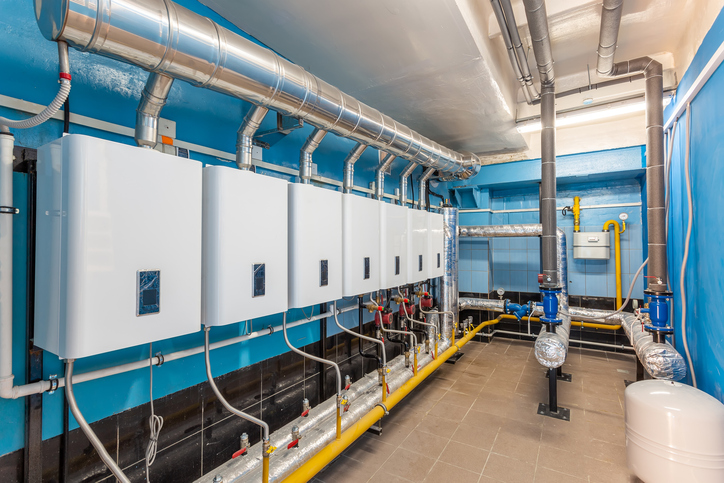Businesses today face increasing pressure to adopt eco-friendly practices and reduce their environmental impact. One area where this can be accomplished is in the installation and use of commercial heating systems. A properly designed and efficiently maintained commercial heating installation can play a significant role in reducing a company’s carbon footprint. By embracing energy-efficient technologies and eco-friendly heating solutions, businesses can not only lower their operational costs but also contribute to global sustainability efforts. This article explores how modern heating systems help reduce carbon emissions and why upgrading your commercial heating system setup is essential for an environmentally conscious business.
1. Energy-Efficient Heating Systems Reduce Fuel Consumption
Improved energy efficiency is the primary way commercial heating system installations reduce carbon footprints. Traditional heating systems often rely on outdated technology that consumes excessive energy. Newer, more efficient systems use less fuel to generate the same amount of heat, leading to lower greenhouse gas emissions. For instance, energy-efficient gas furnaces or electric heat pumps can heat a space more effectively with minimal energy use.
By reducing the amount of energy needed to maintain a comfortable temperature in commercial spaces, businesses can significantly decrease their carbon footprint. These energy savings are good for the planet and the company’s bottom line. Investing in energy-efficient heating systems can result in long-term cost savings through lower utility bills while simultaneously helping the environment.
2. Utilizing Renewable Energy Sources for Heating
Modern commercial heating systems can harness renewable energy sources like solar power or geothermal energy to reduce dependence on fossil fuels. Solar-powered heating systems use energy from the sun to generate warmth for a building, while geothermal systems take advantage of the earth’s natural heat. These renewable heating solutions reduce the need for gas or oil, which are major contributors to carbon emissions.
Incorporating renewable energy into commercial heating setups reduces the carbon footprint of heating operations by providing a sustainable and environmentally friendly alternative. For businesses committed to sustainability, this can help them achieve their environmental goals and make a meaningful contribution to mitigating climate change.
3. Smart Thermostats and Zoning for Maximum Efficiency
Another way these commercial heating units contribute to a lower carbon footprint is through smart technology. Smart thermostats allow businesses to set precise temperatures for their heating systems, ensuring that they only use energy when necessary. These thermostats can be programmed to adjust heating levels based on occupancy or time of day, ensuring that energy isn’t wasted by heating unoccupied rooms or spaces.
Zoning technology, combined with smart thermostats, divides a building into different temperature-controlled zones, enabling businesses to heat only the areas in use. This method reduces overall energy consumption and unnecessary heating. With greater control over the heating system, businesses can reduce energy waste, lower their carbon emissions, and enhance overall system efficiency.
4. Improved Insulation and Building Design
An effective commercial heating setup goes beyond the heating system itself. The design and insulation of the building play a crucial role in reducing the energy needed to maintain comfortable temperatures. Proper insulation in walls, ceilings, and windows helps keep heat inside during winter and cool air during summer. This reduces the strain on the heating system, meaning it uses less energy to maintain the desired temperature.
Good insulation, when combined with modern, energy-efficient heating systems, leads to a significantly lower carbon footprint. Businesses can reduce their energy consumption and heating costs while also creating a more comfortable and energy-efficient work environment. Building design, when optimized for energy efficiency, makes these heating units more effective in achieving sustainability goals.
5. Government Incentives and Green Building Certifications
Many governments and organizations are offering financial incentives and rebates for businesses that choose to install energy-efficient and environmentally friendly heating systems. These incentives are often available for upgrading to systems that use renewable energy, are highly energy-efficient, or meet specific green building standards.
For example, businesses may qualify for tax credits or grants when installing systems that meet Energy Star standards or achieve certifications like LEED (Leadership in Energy and Environmental Design). These programs not only help businesses save money on installation but also promote the use of green technology that contributes to lower carbon footprints. By choosing a green-certified heating installation, companies can reduce their environmental impact while benefiting from financial incentives that make the transition more affordable.
6. Long-Term Sustainability and Environmental Responsibility
The long-term benefits of installing an eco-friendly commercial heating system are substantial. By committing to sustainable heating practices, businesses play a pivotal role in reducing carbon emissions and combating climate change. Whether through energy-efficient systems, renewable energy sources, or smart technology, these heating solutions contribute to the ongoing effort to create a greener planet.
Commercial HVAC installation is a significant part of a business’s overall sustainability strategy. By reducing the carbon footprint of their heating systems, businesses can improve their environmental responsibility, meet sustainability targets, and demonstrate their commitment to preserving the planet for future generations. Additionally, implementing energy-efficient heating solutions often leads to increased public trust and a better reputation within the community.
The role of commercial heating installation in reducing carbon footprints is undeniable. From energy-efficient systems to the integration of renewable energy sources and smart technologies, businesses have many ways to reduce their environmental impact while improving their bottom line. By making the transition to more sustainable heating solutions, companies can lower their carbon emissions, cut energy costs, and contribute to global environmental efforts. Investing in modern, eco-friendly commercial heating system installation not only supports sustainability but also enhances overall operational efficiency. For businesses looking to reduce their carbon footprints and stay ahead in the race for sustainability, upgrading their heating systems is a vital step.
Reduce your carbon footprint with expert commercial heating installation from Air Supply. Call us at 909-980-5001 today to upgrade your system for energy efficiency and sustainability. Make a positive environmental impact now!





